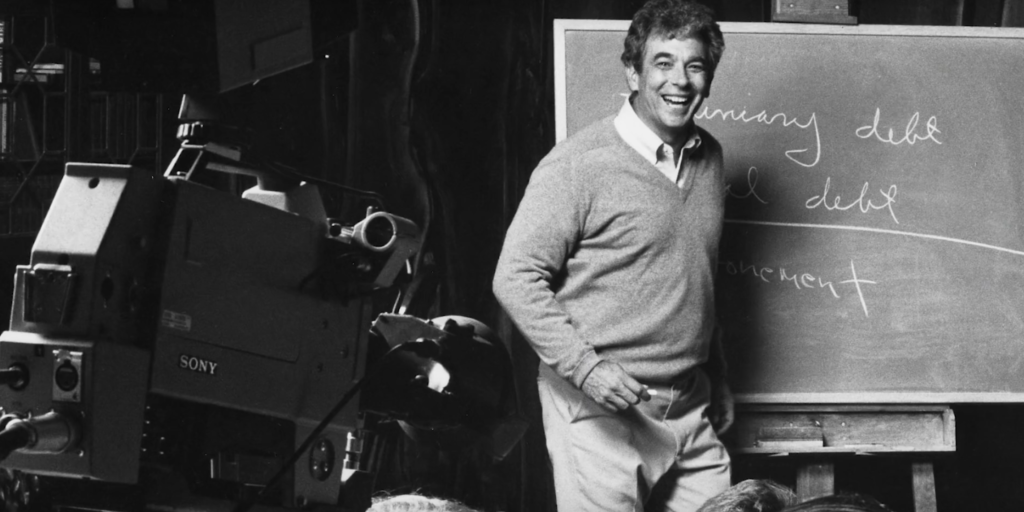
The Teaching Legacy of R. C. Sproul
A newly minted graduate came running across the lawn of Geneva College. Dressed in her gown and holding on to her cap as she ran, she beamed a smile as she approached Vesta Sproul. The graduate then proceeded to tell Vesta how she reads many of her late husband’s books, watches his teaching series, and listens to his teaching. To say this young graduate was exuberant would not quite capture her enthusiasm for what she learned from R.C. She was like Samuel Taylor Coleridge’s “Ancient Mariner.” She had to get in front of Vesta and she had to tell Vesta her story. And then she was gone.
The impact of the teaching ministry of R.C. Sproul has been felt on pastors, scholars, politicians, executives, neighbors, golf club card-playing buddies, children, an occasional rock star, and college students. Of the many contributions of R.C., five are worthy of mention: his commitment to precision, his contribution to inerrancy, his view of classical apologetics, his dogged defending and contending for the doctrine of justification, and his bringing to the fore the holiness of God.
Commitment to Precision
The first contribution is his methodological commitment to precision. R.C. learned precision young. At the accounting firm, R.C. Sproul and Sons, in downtown Pittsburgh, R.C. observed precision in his dad, uncle, and grandfather, the three who constituted the Sproul and sons firm. He learned it from his mother as he sat on her lap while she typed, impeccably. He also learned it from observing The Lord’s Supper at Pleasant Hills Community Presbyterian Church. The pastor trained the elders to come forward to the table in perfectly synchronized, lockstep formation. Footfalls on the brick floor rhythmically echoed through the sanctuary.
That’s methodological precision. R.C. also was committed to theological precision. He did not learn that at Pleasant Hills Presbyterian. The pastor amended the Westminster Catechism, adding questions for the young catechetical students. Here’s one:
Question: Who is the greatest Christian who ever lived?
Answer: Albert Schweitzer.
The theological precision that so marked R.C.’s teaching would come elsewhere. It came while an undergraduate being taught by Thomas Gregory, a Westminster Theological Seminary and University of Pennsylvania trained philosopher. He was one of the few theological conservatives on the faculty of Westminster College in New Wilmington, Pennsylvania. R.C. learned precision, sometimes painfully, from John Gerstner, a Westminster Theological Seminary and Harvard University trained theologian and apologist. One of the few theological conservatives at Pittsburgh Theological Seminary, Gerstner left a lasting impression upon and was an oasis for R.C. One of R.C.’s classmates was Fred Rogers, the comforting voice and sweater-wearing icon of children’s television. R.C. also learned theological precision—while he was also learning Dutch—from Gerrit Cornelius Berkouwer at the Free University in Amsterdam.
R.C.’s was a lifetime of commitment to precision, methodologically and theologically. The contrast to precision is both sloppiness and what R.C. called “studied ambiguity.” Studied ambiguity is purposeful obfuscation, intentional fuzziness. R.C. combatted studied ambiguity in the waning confessionalism of his own denomination. R.C. heard about studied ambiguity at Vatican II from Berkouwer, who attended Vatican II as an invited delegate from the Dutch church. While there, Berkouwer roomed with Hans Kung. And R.C. heard all about it straight from Berkouwer himself.
Inerrancy
R.C. saw studied ambiguity in new formulations of the doctrine of Scripture in the 1960s and 70s—and his work, along with others, led to the very unambiguous Chicago Statement on Inerrancy. R.C. even saw studied ambiguity over the terms justification and imputation in the Evangelicals and Catholics Together debate in the early 1990s.
Behind R.C.’s teaching is his methodological commitment to precision over sloppiness, his commitment to clear conviction over studied ambiguity. His convictions orbited inerrancy, classical apologetics, justification, and the holiness of God.
R.C.’s contribution to inerrancy started at a conference hosted by Ligonier at the Laurelville Mennonite Retreat Center. Soon afterwards Harold Lindsell published The Battle for the Bible (1976). R.C. encouraged Lindsell to use his post at Christianity Today to spearhead an inerrancy initiative. Lindsell concurred that it was a great idea but suggested that R.C. should spearhead it instead. The result was R.C.’s involvement in the ten-year International Council on Biblical Inerrancy, which produced The Chicago Statement on Inerrancy. During the tenure of ICBI, R.C. fought in the trenches alongside of James Montgomery Boice, J.I. Packer, and others equipping the church to know, defend, and contend for this crucial doctrine.
Classical Apologetics
R.C.’s contribution to classical apologetics came through his book authored with Art Lindsley and his mentor Gerstner, Classical Apologetics (Zondervan, 1984) and in his own Defending Your Faith (Crossway, 2002). R.C. believed that belief in God can be demonstrated by reason, following the classical Reformed tradition and the likes of Aristotle, Augustine, Aquinas, the Reformers, Turretin, Edwards, Hodge, and Warfield. For decades R.C. felt like he was alone in the wilderness beating the drum of classical apologetics within the Reformed tradition, while presuppositionalism held sway. Recent books and arguments are early indicators that the tide may very well be turning towards the classical approach.
Imputation
R.C.’s contribution to the doctrine of justification, and specifically imputation, came at a cost of dear friendships. From 1994 through 1997, the document “Evangelicals and Catholics Together” ricocheted through the Reformed and evangelical world. R.C. lined up against ECT, which meant he was on the other side from Chuck Colson, one-time Ligonier board member and long-time friend, and J.I. Packer. R.C. not only made a contribution on the level of the scholarly debate, he also made a contribution to laity. He likely introduced more people to the five Reformation solas than anyone else in the twentieth and early twenty-first century. He taught many people their first theological Latin words when he compellingly spoke of Sola Scriptura, Sola Gratia, Sola Fide, and Soli Deo Gloria. With a winsome conviction he taught so many that Christ takes our filthy rags of sin and gives us His righteous robe. Click To Tweet Dressed in Christ’s righteousness, alone, we have all the righteousness we’ll ever need, and we enter in to the presence of our thrice-holy God.
Holiness of God
Which leads us to the last contribution of his teaching ministry, the holiness of God. R.C. first preached on the holiness of God in the 1960s and gave his first teaching series on it in 1970 at a camp in Saranac Lake, one year before he opened the doors of the Ligonier Valley Study Center in Stahlstown, Pennsylvania. He published the classic text The Holiness of God in 1984. The doctrine of God is likely the glue that holds all of his contributions together. In an interview with R.C. on October 20, 2017, eight weeks before his death, I asked him how he would like to be remembered. He said as a classical Reformed theist. He then referred to his oft-quoted and favorite theologians, Augustine, Aquinas, the Reformers, Turretin, and Edwards. Then he said, “All of these guys were intoxicated by the transcendent majesty of God the Father. I was so gripped by that.”
R.C.’s theological contribution is enshrined in the mission statement of Ligonier Ministries, “To proclaim the holiness of God in all its fullness to as many people as possible.” So we have a glimpse into the legacy of the teaching ministry of R.C. Sproul, a classical Reformed theist from Pittsburgh, Pennsylvania.

